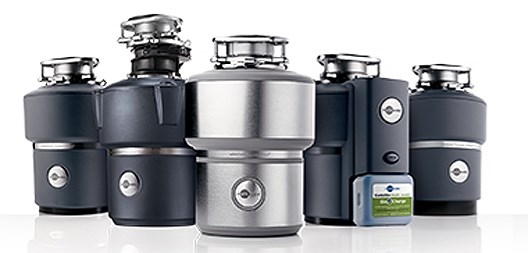Controversy over the proposed ban on in-sink food waste disposal systems (garburators) in Cochrane heats up as a manufacturer reaches out to town council.
Town council originally heard from the Cochrane Environmental Committee (CEC) about the proposed ban on Feb. 22 at the regular council meeting after the CEC concluded a work plan for 2014/2015 which included researching the environmental impact of garburators. Since then, the CEC has prepared a background research document on the positives and negatives of using in-sink food waste disposal systems.
Miles Chester, with the CEC, presented the document to council. The negative impacts outlined included stating the use of garburators leads to increased water usage and stating food waste in the water system negatively impacts aquatic life by increasing nutrient loads.
Kendall Christiansen, a senior consultant for public and environment affairs with InSinkErator, and Tom Olsen, government relations/communications consultant with Tom Olsen Public Affairs/Earnscliffe Strategy Group, disagree with these findings. According to its website, with its global headquarters in Racine, Wisconsin, InSinkErator is the world’s largest manufacturer of food waste disposers and instant hot water dispensers for home and commercial use.
Christiansen believes the town should have consulted professionals within the industry when compiling data about garburators to ensure credibility.
“If you’re looking for negative information then its certainly possible to find that on the internet. But the failure to reach out to industry and professional associations to say ‘Help us understand how these things work’ was sort of the missing step,” Christiansen explained.
According to him, InSinkErator has an in-house environmental engineer, and participates actively in industry research, which helps it to stay current with industry trends, new technologies/systems, etc. The company recently ran a “demo project” called “The Conservatory’ in Calgary” to determine “how effective disposers could be at getting food waste out of household trash.”
For the project, which took place from Fall 2014 to Summer 2015, a building of 65 units was supplied 40 first-time disposers and 10 disposers were upgraded while 15 units did not participate.
“We gave people a first-time disposer along with some education about how to use it. Then we sampled their trash before and a year later, and what we found in Calgary with the building was a 60 per cent reduction in its food waste,” Christiansen said.
He also noted that the California Single-Family Water Use Efficiency Study from 2011 disproved the myth that garburators are not water-efficient.
“(There was a) significant study in California a few years ago that looked at all types of household water use. They looked at a number of cities and they looked at a number of different appliances and fixtures and they clearly said that there is no water efficiency issue associated with disposers.”
Christiansen said there have been a number of studies done regarding water-use with garburators.
“(Those studies) basically say it’s equivalent to one flush a day of a low-flush toilet, so about a liter or two a day. And in the scheme of things, that’s maybe one per cent about what a household uses,” Christiansen explained.
Finally he pointed out that food waste being sent to water resource recovery systems, such as the Bonnybrook Wastewater Treament Plant where Cochrane’s water is sent, does not negatively impact aquatic life.
“In relative terms, composting and water resource recovery systems are relatively comparable – if you have access to one or both that’s better than putting food waste in a landfill. But the added benefit from using the water resource recovery option is you have the potential to create biogas – which doesn’t happen in a composting operation.”
Christiansen explained these plants screen out solid, organic material and put it into a digester which feeds it to microbes that create biogas. Biogas is used to provide heat and power to run the plant while whatever is leftover is composted and turned into fertilizer products.
“(Those plants are) under discharged requirements by the province. Food waste by itself, isn’t the problem it’s really more human waste, as it contains a higher level of nitrogen that has to be dealt with at the plants. There’s nothing special in food waste that causes any complications in that and, in fact, there’s some recent studies that show food waste is actually beneficial for the treatment process at those plants.
“It’s a scary thing to say that they’re killing fish down the river but that’s not what those plants do and food waste has nothing to do with that concern,” Christiansen said.
He and Olsen plan to meet with town council to start discussions about the topic and will be attending the public hearing for the proposed ban at the Cochrane RancheHouse on Tuesday, March 29.
“We’re asking the mayor and council to sort of step back, do a fuller consultation, give us a chance to join the conversation, and we’ll see where we end up.”




